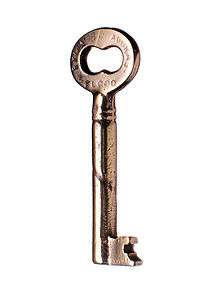Definify.com
Webster 1913 Edition
Clavis
‖
Cla′vis
,Noun.
pl. L.
Claves
(#)
, E. Clavises
(#)
. [L.]
A key; a glossary.
Definition 2025
clavis
clavis
English
Noun
clavis (plural clavises or claves)
- (archaeology) A Roman key.
- 1873, "Proceedings", April 9th, Journal of the British Archaeological Association, 29: 202
- Iron clavis, the solid web-shaped at the edges to fit the wards in the lock, and having a pointed broach and a kite-formed looped haft.
- 1873, "Proceedings", April 9th, Journal of the British Archaeological Association, 29: 202
- A device for restraint of the hands.
- 1904, Luther V. Bell, quoted in The Arena, 32: 540
- His hands were restrained by means of a clavis and bolt (of iron), appropriated to each wrist, and united by a padlock.
- 1904, Luther V. Bell, quoted in The Arena, 32: 540
- A glossary.
- 1784, William Cowper, in [1836] Robert Southey (ed.), The Works of William Cowper, with a Life of the Author, volume V, page 54
- Homer, with a clavis, I have had possession of some years.
- 1784, William Cowper, in [1836] Robert Southey (ed.), The Works of William Cowper, with a Life of the Author, volume V, page 54
- (biology) A key; an identification guide; a series of logically organized groups of discriminating information which aims to allow the user to correctly identify a taxon.
- 1921, Journal of Botany 59: 180
- There are many disadvantages in using a clavis intended for another country, which necessarily includes plants that are absent from our islands while it omits some that are present and neglects the peculiarities of our island flora.
- 1921, Journal of Botany 59: 180
Synonyms
- (Roman key): key
- (device for restraint): shackles
- (glossary): glossary, idioticon, vocabulary
- (identification guide): conspectus, key
Related terms
Translations
archaeology: Roman key
device for restraint of the hands
glossary — see glossary
biology: key; identification guide
Latin

clāvis (a key)
Etymology
From Proto-Italic *klāwis. Either a secondary i-stem derivation of the Proto-Indo-European root *kleh₂u- (“nail, pin, hook - instruments, of old use for locking doors”) which gave also Latin clāvus (“nail”), an inherited Indo-European word originally denoting an instrument for unlocking doors, or a loanword from Ancient Greek κλείς (kleís).
Pronunciation
- (Classical) IPA(key): /ˈklaː.wis/
Noun
clāvis f (genitive clāvis); third declension
- key
- 27 BCE – 25 BCE, Titus Livius, Ab urbe condita libri 24
-
Post hanc orationem claves portarum pecuniaeque regiae ante pedes eorum posuit.
- After this discourse he laid the keys of the gates and of the royal treasure at their feet.
-
Post hanc orationem claves portarum pecuniaeque regiae ante pedes eorum posuit.
- 405 CE, Jerome, Vulgate Iudicum.3.25
-
[…] et videntes quod nullus aperiret tulerunt clavem et aperientes invenerunt dominum suum iacentem in terra mortuum
- […] and, behold, he did not open the doors; therefore they took a key and opened [the doors] to enter [but] their lord was lying dead on the ground.
-
[…] et videntes quod nullus aperiret tulerunt clavem et aperientes invenerunt dominum suum iacentem in terra mortuum
-
- lever or bar for tightening a **** press
- 234 BCE – 149 BCE, Cato the Elder, De Agri Cultura 13
- […] seriam vinariam unam, clavem torculari I […]
-
Usage notes
Not to be confused with clāva (“club”) or clāvus (“nail”).
Inflection
Third declension, alternative accusative singular in -im, alternative ablative singular in -ī and accusative plural in -īs.
| Case | Singular | Plural |
|---|---|---|
| nominative | clāvis | clāvēs |
| genitive | clāvis | clāvium |
| dative | clāvī | clāvibus |
| accusative | clāvem clāvim |
clāvēs clāvīs |
| ablative | clāve clāvī |
clāvibus |
| vocative | clāvis | clāvēs |
Derived terms
Related terms
Descendants
See also
-
 clavis on the Latin Wikipedia.Wikipedia la
clavis on the Latin Wikipedia.Wikipedia la
- clāva
- clāvus
References
- clavis in Charlton T. Lewis and Charles Short (1879) A Latin Dictionary, Oxford: Clarendon Press
- clavis in Charlton T. Lewis (1891) An Elementary Latin Dictionary, New York: Harper & Brothers
- CLAVIS in Charles du Fresne du Cange’s Glossarium Mediæ et Infimæ Latinitatis (augmented edition, 1883–1887)
- Félix Gaffiot (1934), “clavis”, in Dictionnaire Illustré Latin-Français, Paris: Hachette.
- clavis in Harry Thurston Peck, editor (1898) Harper's Dictionary of Classical Antiquities, New York: Harper & Brothers
- clavis in William Smith et al., editor (1890) A Dictionary of Greek and Roman Antiquities, London: William Wayte. G. E. Marindin